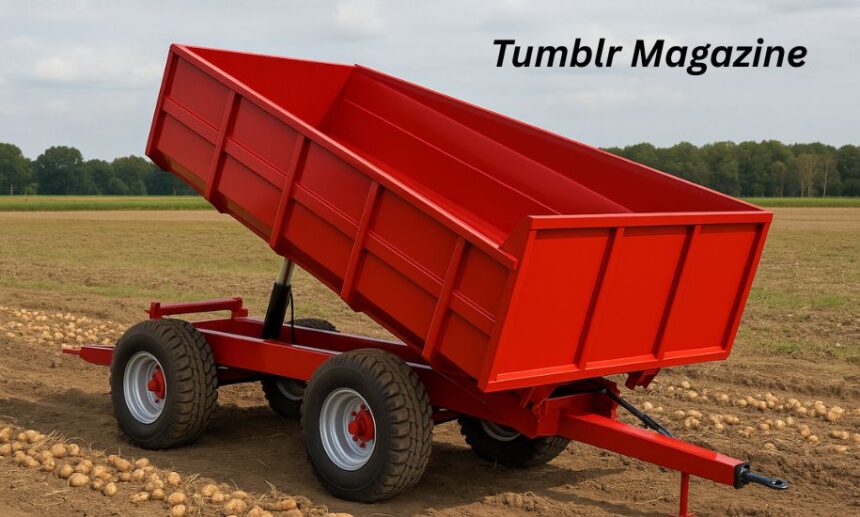The word afruimwagens might not yet be widely known in English-speaking circles, but in Dutch and Belgian contexts, it has a long-standing presence. Derived from the Dutch verb afruimen—meaning “to clear” or “to tidy away”—an afruimwagen is literally a clearing wagon or cart. These practical, versatile vehicles or carts have become essential in agriculture, hospitality (horeca), and even municipal cleanup operations.
From the humble wooden carts of early farming villages to today’s ergonomic, tech-enabled wagons with hydraulic lifts and GPS trackers, afruimwagens have evolved into indispensable tools. They save time, reduce manual labor, preserve crop quality, and keep kitchens, venues, and public spaces organized.
This article explores the history, uses, types, features, benefits, selection tips, and future trends of afruimwagens. Whether you are a farmer, horeca professional, or logistics manager, understanding these carts can help optimize your workflows.
Historical Roots and Etymology
-
Etymology: Afruimen = “to clear,” wagen = “wagon/cart.”
-
Origins: Early afruimwagens were wooden handcarts used in Dutch and Flemish farmlands to transport potatoes, beets, and grain from field to barn.
-
Evolution: Over centuries, they expanded into specialized wagons for agriculture, then into catering and cleanup carts, reflecting urbanization and hospitality growth.
Key Use Cases of Afruimwagens
1. Agriculture
-
Primary role: transporting crops during harvest from field to storage or processing.
-
Why important: reduces crop bruising, speeds up harvest logistics, and cuts down on labor.
-
Example: A potato farmer might use a hydraulic-tipping afruimwagen to unload quickly into a storage pit, preventing bottlenecks.
2. Horeca (Hospitality & Catering)
-
Role: multi-tier clearing carts used in restaurants, hotels, catering halls, and hospitals.
-
Focus: maneuverability, ergonomic design, and durability.
-
Example: A catering hall may use compact afruimwagens with detachable trays to clear large dining rooms efficiently after events.
3. Municipal and Commercial Cleanup
-
Role: waste removal carts/vehicles for parks, streets, and construction debris.
-
Modern angle: many now feature compactors, lifting systems, and hybrid or electric drives for sustainable operation.
Types of Afruimwagens
For Agriculture
-
Standard Wagons: sturdy, high-capacity carts for bulk crops.
-
Tipping/Hydraulic Wagons: allow for fast unloading of crops.
-
High-Capacity Models: designed for large-scale farms handling peak harvest volumes.
For Horeca
-
Compact Service Carts: maneuverable in tight dining or kitchen spaces.
-
Multi-Tier Clearing Carts: allow stacking of trays for faster turnover.
-
Modular Trays: detachable for easy washing and hygiene compliance.
For Municipal/Commercial Use
-
Enclosed Cleanup Vehicles: prevent debris spillage during transit.
-
Multi-Compartment Bins: for waste segregation and recycling.
-
Tech-Enhanced Models: GPS tracking, electric drives, and load sensors.
Features and Specifications to Consider
-
Load Handling: hydraulic tipping systems, reinforced frames, and balanced weight distribution.
-
Mobility: rugged wheels for farms; casters or rubberized wheels for horeca use.
-
Modularity: detachable trays, adjustable heights, and collapsible designs.
-
Capacity: from compact horeca carts to multi-ton farm wagons.
-
Tech Add-ons: GPS, load sensors, route optimization software, and in some municipal models, electric or hybrid drivetrains.
Benefits of Afruimwagens
-
Efficiency & Time Savings
-
Reduce trips during harvest or service peaks.
-
Faster turnover in kitchens and catering.
-
-
Labor Reduction & Ergonomics
-
Hydraulic systems prevent heavy lifting injuries.
-
Ergonomic handles reduce strain in horeca settings.
-
-
Quality Preservation
-
Gentle transport systems prevent bruising of potatoes, apples, and other delicate produce.
-
-
Cleanliness & Organization
-
Keep kitchens, venues, and fields organized by centralizing load movement.
-
-
Sustainability
-
Electric or hybrid cleanup afruimwagens reduce emissions.
-
Fewer trips = reduced fuel consumption and carbon footprint.
-
Choosing the Right Afruimwagen
When selecting the right afruimwagen, consider:
-
Space & Terrain: narrow restaurant hallways vs. uneven farm fields.
-
Load Capacity: light dishware vs. heavy crop loads.
-
Material Quality: stainless steel for horeca (hygienic, rust-proof); reinforced steel or aluminum for farming.
-
Wheel Durability: rugged pneumatic tires for agriculture; quiet, rubberized casters for hospitality.
-
Extras: foldability, crop liners, detachable trays, or towing hitches.
Best Practices for Use and Maintenance
-
Even Load Distribution: prevents tipping and prolongs wheel/axle life.
-
Regular Inspections: check tires, axles, hydraulic seals.
-
Cleaning: wash trays/carts after every use, especially in horeca.
-
Lubrication: keep moving parts smooth for long life.
-
Dry Storage: store indoors to prevent corrosion.
Modern Trends and Future of Afruimwagens
-
Smart Fleets: equipped with GPS tracking, load sensors, and apps to optimize routing.
-
Electric Power: hybrid or fully electric afruimwagens for eco-friendly cleanup.
-
Automation: semi-autonomous carts in horeca and farming (robotic tray collectors, driverless crop transporters).
-
Cultural Evolution: from rustic wooden farm carts to sleek stainless-steel horeca trolleys, afruimwagens symbolize a shift toward efficiency-driven, sustainable design.
Case Study: Hard-Racing Perspective
A recent blog on Hard-Racing highlighted the dual role of afruimwagens in horeca and farming. The article emphasized:
-
Durability and ergonomic benefits in restaurants.
-
Robust field carts that streamline farm workflows.
-
A buyer’s checklist focused on size, terrain, weight capacity, and maintenance routines.
This perspective shows that afruimwagens are not just farm wagons but versatile carts crossing industries.
Conclusion
From farmlands to fine dining halls, afruimwagens embody practicality, efficiency, and adaptability. They bridge the gap between tradition and technology—evolving from simple wooden carts into smart, sustainable tools. Farmers rely on them for harvest speed and crop safety. Horeca professionals count on them for quick clearing and better hygiene. Municipalities see them as eco-friendly solutions to urban waste management.
For anyone looking to improve efficiency, reduce labor strain, and embrace sustainability, afruimwagens are an investment worth considering.
And as always, for more insightful guides and in-depth breakdowns of industry tools, check out Tumblr Magazine, where functionality meets knowledge.







